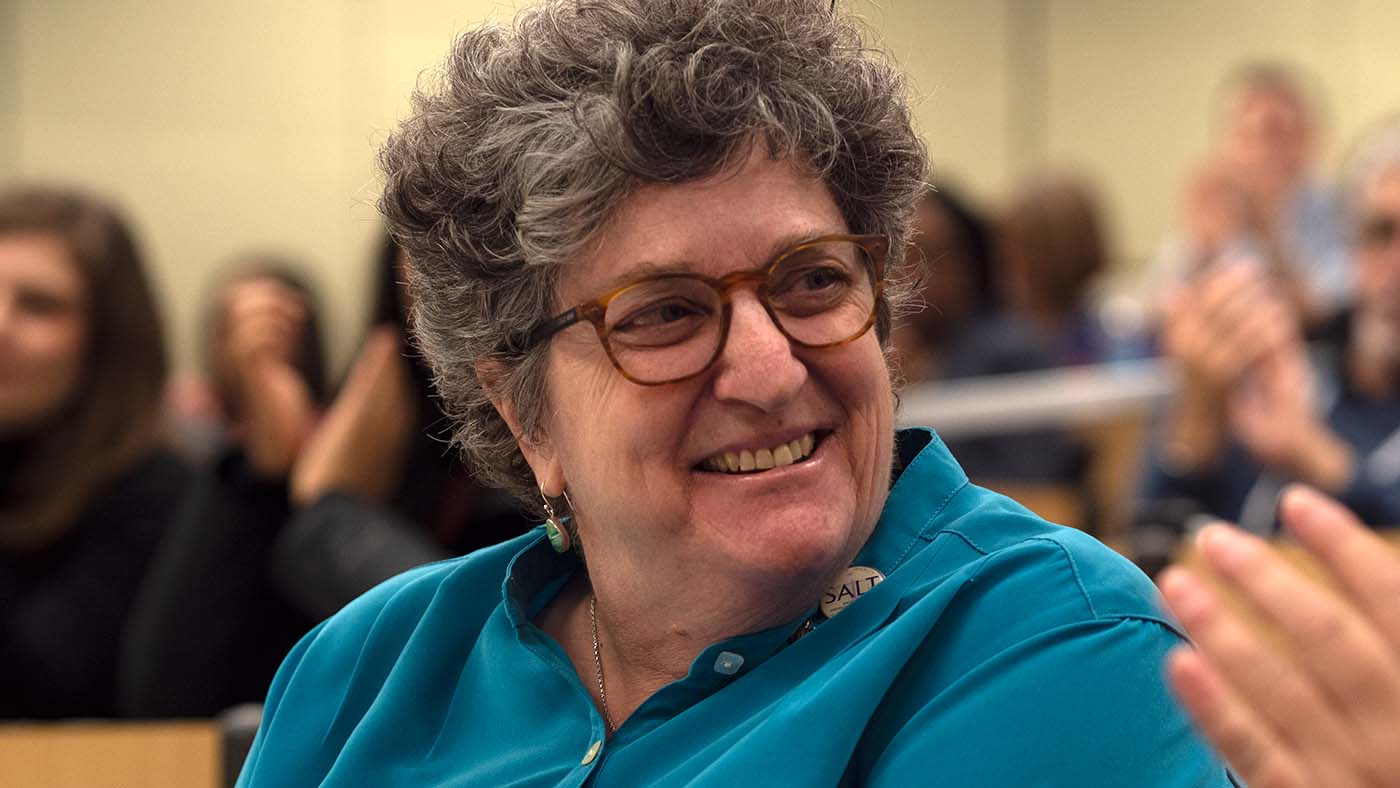Lisa Brodoff considers herself lucky. That’s because for the past 25 years, she’s held her dream job as a professor and director of Seattle University School of Law’s nationally ranked Ronald A. Peterson Law Clinic. Alongside her academic career, Brodoff has been a fierce advocate for laws and policies to protect the state’s most vulnerable populations.
That is the legacy she will leave behind, and many will remember her for, as she prepares to retire at the end of this academic year after a remarkable career that spans four decades.
“I have had the rare and unparalleled opportunity to speak out and advocate for policy changes and innovations through scholarship, media, and legislative advocacy that attorneys in civil legal aid and judges are restricted in doing. I love that part of the job of a law school professor,” Brodoff said.
Her time in the classroom brought equal joy. “I get to have our students apply what they’ve learned in their doctrinal and legal writing courses to the messiness, excitement, scariness, and social justice work of representing real clients in real time,” she said.
As a caring and supportive mentor to her students, Brodoff made a point of providing a key element that was missing from her own law school experience.
“I wanted to be that person to help train our students to become the next generation of lawyers,” she said. “One of my proudest achievements is that my students have gone on to become leaders in the profession, particularly in elder law and administrative law.”
Carla Calogero ’09, a former student of Brodoff’s and now a member attorney at Reed Longyear, has become one such leader. Long before she built a successful elder law practice, Calogero worked at the clinic’s front desk. One day, after photocopying materials related to elder law, she mentioned to Brodoff that the topic interested her, since she had recently earned a master’s degree in bioethics.
“She really helped to shape my law school experience by encouraging me to consider elder law as a potential practice area. Once she opened that door, and my eyes, elder law became a passion of mine. I can’t state enough how much of an influence Lisa has had on my life and career,” Calogero said.
As one of the top elder law attorneys in the state, Calogero has worked side-by-side with Brodoff on projects such as the Washington State Dementia Action Collaborative.
Brodoff is beloved by her students, not just for what she teaches but also how she teaches. Brodoff incorporates music into her classes, a talent that comes from being a longtime member of the Righteous Mothers, a band of women who write and perform songs that incorporate social commentary on the law, women’s empowerment, and other topics.
“Every student of hers will tell you she is a one-of-a-kind law professor. She sings in her classes and encourages all types of creative expression. She makes learning so fun, and her enthusiasm is infectious,” Calogero said.
Brodoff draws from a deep well of experience working as an attorney and judge. Before joining the Seattle U Law faculty, she spent nearly 15 years with Puget Sound Legal Assistance Foundation, mostly on elder law cases, providing advice and representation to clients in the areas of public assistance, Medicaid, and Social Security. She then transitioned to the judiciary, working first as a chief review judge for the Department of Social and Health Services, and then as a chief administrative law judge for the Office of Administrative Hearings.
“I was struck by the importance of administrative courts to the lives of low-income people; the administrative hearing system is really the only social justice system for people experiencing poverty,” said Brodoff. “By becoming a chief judge in that system, I hoped to make these courts more accessible and fairer to low-income appellants.”
That experience informed her work as a professor, where she had the ideal platform to become one of foremost experts and fiercest advocates for the rights of the elderly, persons with disabilities, and the LGBTQ+ community. Throughout her career, she has pursued a range of challenges to laws and policies before courts in Washington state.
In Gormley v. Robertson in 2004, she successfully argued that the meretricious relationship doctrine, which bestows legal rights on non-married couples, should be applied to separating same-sex couples. In the 2014 case Weems v. BIIA, Brodoff helped win a case that required administrative agencies to provide legal representation for appellants in agency hearings when their disabilities prevent self-representation. She followed that case with a successful petition for rulemaking around the requirement for legal representation in such cases.
“This was a huge win and resulted in part from my article in the Seattle Journal for Social Justice on representation as a disability accommodation and advocacy for a civil right to counsel,” she said.
More recently, in Washington’s last legislative session, Brodoff worked directly with her clinical law students to win a right to good cause exception when people are late in requesting public assistance administrative hearings. “This is another huge win from the Administrative Law Clinic advocacy that righted a wrong for public assistance applicants and recipients who, for good reasons like homelessness, health issues, and experiencing violence, are not able to get their hearing requests in within 90 days,” she said.
In retirement, Brodoff will enjoy family time and travel, but she’ll miss daily interaction with students and colleagues.
“The relationships that I’ve had are what I will miss the most. I love working with students and seeing their growth, their potential fulfilled. That will be hard. But I hope to continue to be an ambassador for the law school to potential students, because we need educated lawyers who are driven by a social justice mission, now more than ever,” she said.

